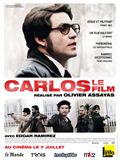
|
Carlos review
:. Director: Olivier Assayas
:. Starring: Édgar Ramírez, Alexander Scheer
:. Running Time: 8:00
:. Year: 2010
:. Country: France
|
Through the portrait of a media figure, of a still living generational myth (although still behind bars), Olivier Assayas embraces three decades of international geopolitics and delivers a movie marathon as explosive as a charge of C-4 explosives. Carlos is destined to be a television series, totaling 5 and a half hours and divided into 3 parts. But this complex portrait of one of the biggest terrorists of the late 20th century can be appreciated on the big screen. Presented in full at the 63rd Cannes Film Festival, Carlos could be watched like an extremely long feature film benefiting from movie-like budget and production quality, thus sweeping, with a blast, the false debate about its presence at Cannes. This explosion occurs in the opening scene with the blasting of a car, thus announcing the type of movie we are about to watch. Assayas does not stick to a narrow biopic but gives himself the means to meet his ambitions. Result: a huge machine launched at the speed of an AK-47 bullet.
In a nervous rhythm, we discover the young Ilich Ramirez Sanchez, a pro-Palestinian Marxist revolutionary in his accession to international fame. A reputation forged by terrorist acts. Through his journey, a light is shone upon the major political upheavals of the last 30 years of the 20th century which the film exposes with impressive clarity. Elusive, complex, the character is a reflection of his era. Embodied by the chameleon-like body of Edgar Ramirez, Carlos occupies the space and the frame of the film, his charisma invades the screen, brightening his many contacts in high diplomatic spheres and seducing women and men. This warlord, Assayas makes of him an almost "rock and roll" figure, burning through his life as that of his enemies. He is extravagant, ambitious, idealistic, mysterious and profoundly human. Throughout the film, we observe how these weapons serve his ambitions, and how they contribute to his decline.
In the first part, the attacks and hostage-takings multiply, old-style (since, we've had September 11 and suicide bombers), via rockets fired from the landing strip at Orly, via rigged cars, or man to man, gun in hand. Carlos is one of the first terrorist's who understood how to use the attacks as an effective mode of communication. His portrait, universal in nature, is that of the end of a world, that of the Cold War, and the start of another. A real metaphor for the struggle of collective causes combined with personal ambitions. Clearly, the story of how the revolutionary becomes a mercenary funded by Big Business, before becoming an outdated tool once the Soviet Union collapsed. The pace of the film adopts the cadence of the terrorist's career: rampant during his glory years, slower during his underground years, from hiding place to hiding place, pursued by all governments of the world. More than a terrorist, Assayas makes of him a modern hero by concentrating all the ideological battles of an era. This is an arousing film and definitely the director's best since Clean.
Moland Fengkov
Translated into English by Christina Azarnia

 French Films: New 2012+ Reviews French Films: New 2012+ Reviews
 French Films: 1998 - 2011 Reviews French Films: 1998 - 2011 Reviews
 French Movies Group French Movies Group
 French Music Reviews French Music Reviews
|
|


